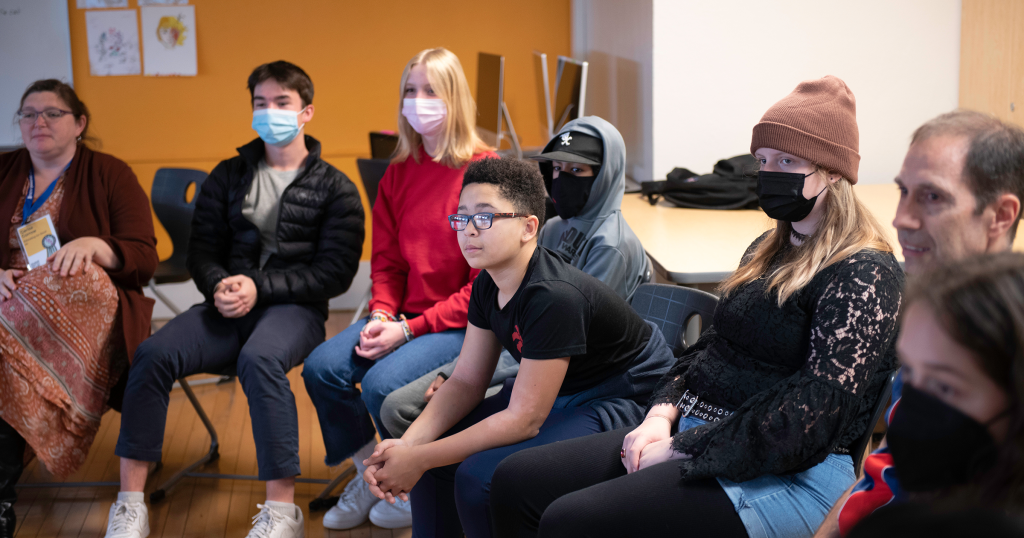
It’s a Friday afternoon. Normally, students are abuzz, packing up at the end of the day, chatting about weekend plans, waiting impatiently for the clock to hit 3:00. Not this Friday, though. About 40 middle and high school students are sitting in a circle, quietly and calmly discussing what’s happening in their school, a process being replicated throughout the building. Two advisors (teachers) are seated outside of the circle. It’s the first Town Hall of the school year.
“I’m sick of people swearing. We don’t need to hear that. We don’t need to do it. We have other forms of communication. It doesn’t help the learning.”
“I’d like to talk about cell phones. I know we don’t get to use them during the day, but when we pull it out and an advisor asks us to hand it over, sometimes it feels a little aggressive. Like, give me a minute to shut off my phone.”
At La Crosse Polytechnic, a teacher-powered school in Wisconsin, students regularly meet for a Town Hall gathering. The purpose of a Town Hall is to discuss what is going well in the school and what can be improved upon by both students and staff. Issues from unsanitary bathroom practices to swearing, from cell phone usage to feelings of safety are all fair game. Led by a student council member, students share their thoughts one at a time, providing advisors the opportunity to gather notes. At no point does an advisor add to the conversation or take over the process. Town Halls are student led.
“Everything that you do and say? People find out. When you try to find a job-word gets out. People talk and you could miss out on a job. Negative things stick with you more than positive. You will get stuck in a cycle of being immature. Saying inappropriate things. It’s not funny.”
“I agree. If the advisors have to keep asking you to do what you’re supposed to do, OUR learning is being taken away. At least once a day there is someone who disrupts class when people are trying to get their work done. Stop it. We want to learn.”
Fast forward one week to the following Friday. The advisors at La Crosse Polytechnic had an afternoon of Professional Development. First on the agenda was to take a deep dive into the notes from the Town Hall. After five minutes of silent perusal of the documents, advisors chatted using the “I Noticed. I Wondered” protocol, where we spent time analyzing and synthesizing student comments.
One advisor shared, “I noticed many students brought up the fact that their last afternoon class is tough because they are anxious about after school plans.”
Another added, “I noticed one group felt advisors were too strict about the cell phone policy, yet another group commented that advisors were not strict enough. Seems like whoever made the first comment, students just agreed and kept that theme going. I wonder if all students felt comfortable sharing their opinion.”
The conversation continued to ebb and flow about various concerns raised by students. Eventually, the advisors focused on three main concerns to address, coming up with concrete solutions for each.
“We need to respect our bus drivers more. They don’t make a lot of money and they’re trying to earn a living to provide for their families.”
“Can I just bring up the topic of deadlines? Every students’ situation is different. Deadlines might be unfair to students who have specific situations where they need more understanding. Can advisors be more flexible?”
The following Monday, advisors rolled out the solutions to student concerns initially raised at the Town Hall. One solution included giving students a planned 2 minute cell phone break approximately 30 minutes before the end of the school day to ensure students knew their after school plans. This alleviated student concerns about not being able to check their cell phone for after school plans and advisor concerns of students leaving class to “go to the bathroom” to check their phone or (not-so) sneakily pull their phone out during class to check text messages. This plan resulted in both advisors and students having a smoother end of the school day.
Other solutions focused on re-teaching expectations and implementing more concrete systems of accountability. Each time a system or expectation was introduced, advisors shared that this was in response to student concerns raised at the Town Hall.
After one week of implementing new systems, the advisors asked students what they felt about the response. Students provided input and feedback, voicing their appreciation and hope for positive change.
In a teacher-powered school, teachers have voice and agency to make decisions on the day-to-day governance of the school, creating structures that support students. As teachers or advisors, our goal is to develop and implement systems in order to respond more quickly to student concerns and needs. In a traditional school setting, systems change often takes a long time, with decisions made by administration who may or may not be as connected to the issue as the teachers. As advisors working in a Teacher Powered School, the kind of agency to make critical change in a timely manner makes us feel empowered as practitioners to do what is best for students.
I recognize how professionally rewarding it feels as an advisor to make change within my school; with that in mind, I recognize how empowering it must feel for students to recognize they have a voice to make a positive change in their school, the place they spend a majority of their time.
After advisors shared solutions, one student voiced her emotions around the process…
“I feel like I can be honest when I have a problem. I thought I was the only one who was frustrated, but now I see if I am feeling like something is a problem, I have a voice and can use that voice to make changes.”
Isn’t that the goal of a teacher-powered school? To transfer the power we educators feel to our students, helping them become the next generation of empowered advocates in our community and society.
###
 NEWSLETTER SIGN-UP
NEWSLETTER SIGN-UP



